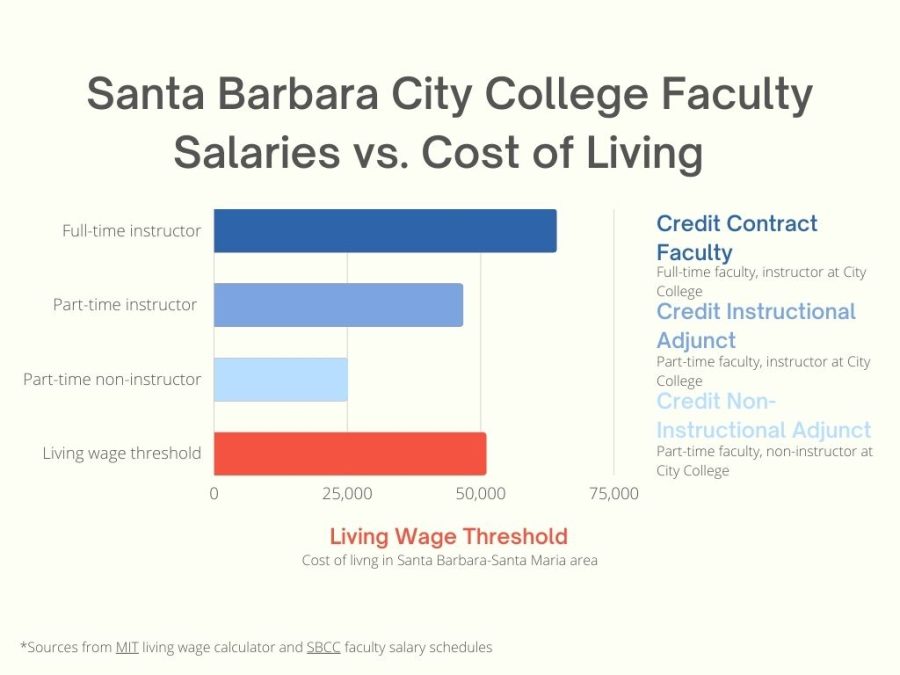City College courses are taught by both full-time faculty and part-time, otherwise known as adjunct, instructors. The proportion of classes taught between the two groups is nearly split down the middle: 43% of classes at City College are taught by adjunct professors according to the Faculty Association (FA).
“Adjuncts are kind of the heart and soul of [City College],” said Josh Molina, an adjunct journalism professor at City College.
Molina has taught at City College for more than 13 years as a freeway-flier, a type of career adjunct who commutes to multiple campuses in order to piece together a living. Another type of adjunct includes specialists in their field who teach classes, aside from other work, in order to bolster their income.
The FA reports that despite the significance of these instructors, adjuncts hold a differing credit contract from their full-time counterparts, and their pay is determined by Teacher Load Units (TLUs). TLU’s are the amount of units an instructor is allowed to teach. One TLU is equal to 17.5 hours in the classroom, and adjunct instructors may pick up a maximum of 30 TLUs over the course of a year, including summer sessions. Therefore, the maximum number of hours in a year an adjunct may work is 525.
“Sometimes I am really scrambling to find instructors and give them as many units as possible,” said Cornelia Alsheimer, president of the FA.
According to the FA, full-time employees are contracted to teach 30 TLUs, like adjuncts. Unlike their adjunct counterparts, a full-time employee’s contract guarantees them that work.
City College’s website states that an entry-level adjunct employee makes $88.72 per hour. Considering the maximum 525 hours per year adjuncts may legally work, the annual salary of a first-year adjunct comes out to a maximum of $46,578.
The minimum salary listed for an entry-level full-time instructor is $64,204.
The maximum entry-level adjunct salary is only 73% of the minimum salary of a full-time employee contracted to work the same amount of hours. Furthermore, it does not meet the threshold for a living wage listed by MIT for a single adult living in the Santa Barbara-Santa Maria area.
City College administration could not be reached for an interview.
“I wish they [City College] would hire some of these adjuncts to full-time positions because we’re invested in the college, we’ve been teaching for years, we love the college, [and] we’re part of multiple generations of students who we’ve impacted,” Molina said.
Additionally, adjuncts are not currently eligible for the same health care benefits as full-time instructors. According to the FA, an adjunct must be employed for eight years before receiving any health care benefits. With the choice to opt-in after those eight years, those who do would only receive a maximum 50% discount on their premiums.
Alsheimer expressed discontent regarding City College’s current situation with health insurance for adjuncts.
“I’m not happy with what we can offer at the moment,” Alsheimer said.
Members of the FA, under Lynne Stark, hope to take advantage of a new fund established by California governor, Gavin Newsom. Alsheimer shared that the 2022-2023 budget for the California government allocated $200 million to pay for health insurance for part-time faculty at community colleges.
The fund is intended to reimburse 100% of costs incurred by these colleges in paying for the health insurance of part-time employees, under one condition: they must be offered the same insurance as full-time employees.
The decision to implement this program has been under negotiation within the FA since September 2022.
“I would put more of the responsibility for any delay that’s happening by the real lack of information that comes from the state,” Alsheimer said.
The FA continues to demonstrate their concern regarding the strenuous process of accomplishing these tasks with the state. The association has expressed that it’s a monumental responsibility, though it is one they hope will improve working conditions for adjunct instructors.
For some adjuncts, this is not enough.
“If we can reward some of these part-time teachers or these adjuncts with more full-time positions, that’s only going to benefit the students,” Molina said. “It’s only going to positively impact them because an adjunct’s not looking to negotiate, an adjunct is looking for an opportunity, and when you have an opportunity you’re hungry, and you’re going to give that all to the students.”














